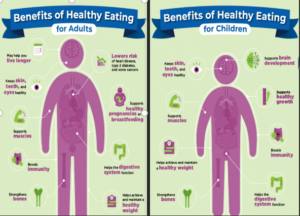
Good health requires healthy food. And sitting at the table until you’ve eaten your veggies is no punishment. Healthy eating is a way of life, so it’s essential to establish simple, realistically, and ultimately livable regimens. Your health is what you make of it. Everything you do and think of either adds to the vitality, energy, and spirit you possess or takes away from it.
A nutritious, well-balanced diet – along with physical exercise and refraining from smoking – is the foundation of good health. Healthy eating includes consuming high-quality proteins, carbohydrates, heart-healthy fats, vitamins, minerals and water in the foods you take while minimising processed foods, saturated fats and alcohol. Eating this way helps you maintain your body’s daily purpose, promotes optimal body weight and can assist in disease prevention.
Benefits of healthy eating:

A Healthy Diet Can Help Prevent Disease
Obesity is not the only nutrition-related basis of disease onset and progression. Surplus or deficiency of certain nutrients can also contribute to health issues. As for instance, a lack of calcium in your diet can predispose you to developing osteoporosis, or weakening of your bones, while too much saturated fat can cause cardiovascular disease, and too few fruits and vegetables in your nutrition plan is linked with an increased incidence of cancer. Consuming foods from a wide variety of sources helps ensure your body has the nutrients it needs to avoid such health issues.
Food Choices Affect Your Mental Health
When prioritising a healthy diet, it’s not just our physical health that feels a boost. Research shows that food choices affect mental health too. And a diet rich in vitamins and minerals is connected with a lower risk for mental health disorders, including anxiety, depression, and attention-deficit/hyperactivity disorder (ADHD).

Eat a Healthy Diet, and You May Lose Weight
In addition to the quality of the food we consume, the quantity matters when considering good eating habits. Taking in the same number of calories as you burn ensures your weight remains constant. But consuming more than you burn results in weight gain as your body converts extra calories to fat tissue. When you accumulate fat tissue, you risk developing one or more health complications, including heart disease, hypertension, respiratory issues, diabetes and cancer. A healthy meal routine without excess calories helps you not only feel better but can prolong your life.
Considerations: Food is not the enemy. Rather than focusing on what you shouldn’t be eating, think about what you can add to your plate to enhance your health, like nuts for heart-healthy monounsaturated fatty acids or raspberries for their fibre and antioxidants.
Breastfeed infants:
A healthy diet starts early in life – breastfeeding fosters healthy growth and may have longer-term health profits, like reducing the risk of becoming obese and developing non-communicable diseases later in life. Feeding babies exclusively with breast milk from birth to 6 months is essential for healthy sustenance. It is also crucial to introduce a range of safe and nutritious complementary foods at 6 months while breastfeeding until your child is two years old.
Eat plenty of vegetables and fruit:
They are vital sources of vitamins, minerals, dietary fibre, plant protein and antioxidants. People with diets rich in vegetables and fruit have a significantly lower risk of obesity, heart disease, stroke, diabetes and certain types of cancer.
Eat less fat:
Fats and oils are concentrated sources of energy. To avoid unhealthy weight gain, total fat consumption should not exceed 30% of a person’s overall energy intake. Consuming excess, mainly bad fat, like saturated and industrially-produced trans-fat, can increase the risk of heart disease and stroke. Using unsaturated vegetable oils (olive, soy, sunflower or corn oil) rather than animal fats or oils high in saturated fats (butter, ghee, lard, coconut and palm oil) will help take in healthy fats.
Limit consumption of sugars:
For a healthy diet, sugars should represent less than 10% of one’s total energy intake. Reducing even further to under 5% has extra health gains. Choosing fresh fruits instead of sweet snacks such as cookies, cakes, and chocolate helps reduce the intake of sugars. Limiting soft drinks, soda, and other drinks high in sugars (fruit juices, cordials and syrups, flavoured milk and yoghurt drinks) also aids in reducing the intake of sugars.
Reduce salt intake:
Keeping your salt intake to less than 5h per day helps avoid hypertension and lowers the risk of heart disease and stroke in adults. Limiting the quantity of salt and high-sodium condiments (soy sauce and fish sauce) when cooking and preparing foods helps reduce salt intake.

Our body’s mission is to keep us alive; we can help it do that by supplying it with the energy and nutrients it needs to stay healthy so that it can feel great every day. The payoff of a healthy lifestyle is humongous. Imagine your cells smiling back at you and saying: “Thank you!”.



